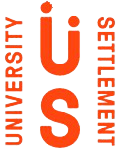Last month University Settlement’s Director for Advocacy Veronica Wong testified before the New York City Council, presenting our perspective on the City’s withdrawal from a previous commitment to cover more of nonprofits’ true operational costs.
The city’s decision on what it refers to as the “indirect rate” will significantly impact University Settlement’s programs and services, as well as those of our peer non-profits, and the communities we partner with.
Read Veronica’s full testimony below:
For 134 years, University Settlement has been one of New York City’s most dynamic social justice institutions. Our programs include eviction prevention and benefits assistance, quality early childhood programs, afterschool and youth development programs, extensive mental health services for adults, families, and children, adult literacy, arts enrichment programs, support for the aging, and community center resources. Our programming extends across Manhattan and Brooklyn.
Our work with, knowledge of, and connection to our neighborhoods is indispensable; this has never been clearer than during the Covid-19 pandemic.
During the spring lockdown, our teams pivoted to help distribute emergency food, provide hand sanitizer and masks, ensure our neighbors had sufficient medication and other emergency supplies, and confirm the safety of our communities. In the fall, we began providing in-person early childhood support and serving as Learning Labs for our youth in Brooklyn and Manhattan, which the city had asked us to provide and we were honored to do.
In this context, we must express our dismay at New York City’s decision to withdraw from its funding commitment to cover more of the true operational costs of nonprofits.
By only receiving 60% of the funding we were promised for FY20, we experienced a loss of $338,000. Even if we can accommodate an unknown, likely significant budget gap for FY21, no organization should experience this amount of budgetary instability due to the city’s lack of transparency.
To answer Council Member Rosenthal’s question, we have been paid some of our indirect costs at our old rate, which is 10 or 12% depending on the contract, but we have not been paid for all of our FY20 contracts yet.
Like all nonprofits, we keep our operations lean. We are used to doing more with less. We understand why talking about administrative and operational costs often takes a backseat to programmatic needs. But the truth is: no organization can provide programming without a robust and reliable operational infrastructure.
Our Learning Labs, which the city asked us to run, as examples of how reduced operational capacity can hurt programming:
- To staff our early childhood and youth programming, we are required to run extensive background clearance on all staff working so closely with our young people. We cannot begin our programming until all our staff are cleared, and it takes weeks to clear each staff member. This multi-step process requires a knowledgeable HR team, which the indirect funding rate would support, to shepherd the hiring process.
- The indirect cost rate funds our backend staff including our IT department, which we need for our virtual programming. When the city approached University Settlement to offer Learning Labs to help children of essential workers, we were ready to do so within weeks. Yet, by choosing to not fully fund our indirect rate, which supports our IT department, the city ignores the very infrastructure we need to provide a service they asked for.
Starving our operations has additional ramifications beyond simply our programming. For example:
- As an organization, we are committed to working with local small businesses. University Settlement works with hundreds of local vendors every year who supply everything from snacks for afterschool programming, food for clients, consultant services, and computers/tablets in this remote environment. The loss of indirect funding directly impacts our ability to support local vendors.
- The indirect cost funding also goes towards maintaining and upgrading our facilities. Our community members should have access to clean and well-maintained facilities, and we cannot do that if we can’t pay facilities staff.
- Nonprofits are anchors in their communities not only through the programming they offer but also in offering opportunities and paid work. Across our programming, we employ part-time staff and contract with many individual consultants, all small businesses themselves—like artists for early childhood classes, learning specialists for afterschool programming, exercise teachers for our seniors. We want to continue providing these opportunities for paid work, but the budgetary uncertainty renders it difficult for us to plan for hiring or have the HR team process hiring.
With this public health crisis accelerating inequality across NYC, we cannot think of a more inopportune moment to be guided by an austerity outlook that we know does not work for our communities. In the months ahead, this is certain: NYC will rely on nonprofits like University Settlement and the networks we are a part of—to provide programming for our children so that they remain healthy, engaged socially, and supported in their learning; to provide material aid through food and housing support for those facing economic stress; to be a trusted source of public health information and distributor of resources, and to strengthen a city through caring for our communities.
We, at University Settlement, are proud to do our part to support NYC. We only hope that NYC will support us as well.

